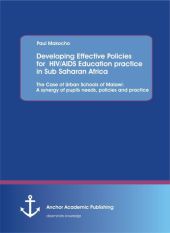 Neuerscheinungen 2014Stand: 2020-02-01 |
Schnellsuche
ISBN/Stichwort/Autor
|
Herderstraße 10
10625 Berlin
Tel.: 030 315 714 16
Fax 030 315 714 14
info@buchspektrum.de |

Paul Makocho
Developing Effective Policies for HIV/AIDS Education practice in Sub Saharan Africa: The Case of Urban Schools of Malawi
Erstauflage. 2014. 316 S. 56 Abb. 220 mm
Verlag/Jahr: ANCHOR ACADEMIC PUBLISHING 2014
ISBN: 3-9548921-2-X (395489212X)
Neue ISBN: 978-3-9548921-2-9 (9783954892129)
Preis und Lieferzeit: Bitte klicken
HIV/AIDS has been named the Sub Saharan disease. In countries that have achieved significant declines in HIV prevalence, young people have registered the biggest behavioural changes. It means they hold the keys not only to our understanding of the epidemic, but more importantly, to the efforts required to stem the tide of infections. However, the majority of young people are ignorant of how to prevent transmission, have low compliance to condom use, which is in some cases accentuated by misconceptions about HIV/AIDS transmission and have insufficient knowledge regarding transmission and avoidance behaviours. As such, consensus on feasible preventive interventions target young people, particularly those in schools. It is on this premise that the book unlocks the key pillars in effective HIV/AIDS education policies and practices.The study has drawn upon the experiences of selected Urban Schools in Malawi to explore the needs of young people in classroom, the extent to which the classroom practices respond to the needs, and the factors influencing these using questionnaires, interviews, lesson observations, and document analysis. Malawi typically represents most Sub Saharan African countries in terms of challenges faced by education systems. Given the similar cultural settings of the people of Sub Saharan Africa, the findings and recommendations of the study generalises to the education systems of Sub Saharan Africa to a greater extent. The book shows the need for open discussion climates on HIV/AIDS issues despite a conservative cultural and religious adult world that is not open. It has also identified a need for explicit and accurate knowledge on HIV/AIDS issues, opportunities to acquire behavioural skills for HIV prevention, and involvement of external speakers in classroom HIV/AIDS education.Current classroom practice does not address the pupils needs adequately. Factors influencing this can be linked to lack of policies responsive to culture and religion, ineffective and inadequate teaching policy guidelines, and lack of a policy prioritising HIV/AIDS education.
The findings suggest that in future, effective HIV/AIDS Education needs to be informed by the pupils needs. To address these needs, support from the wider society and related policies, coupled with appropriate management and classroom practice will be required. The book is therefore an indispensable tool for education systems in Sub Saharan Africa. It provides an effective model for the development of effective HIV/AIDS policies and practices in HIV/AIDS education curricula.
Dr. Makocho holds a PhD in Science Education from one of the UK s top ten universities, the University of Leeds.He has a teaching experience spanning 30 years in primary, secondary, college and university levels of Education in Malawi. This vast experience has given him an edge among both writers and stakeholders in the development of HIV/AIDS education policies and practices for systems of education. He is currently a chief lecturer in Science Education at Domasi College of Education in Malawi.


